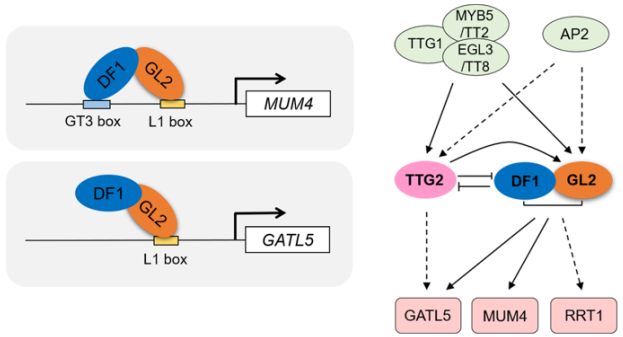
Pectin is a complex cell wall polysaccharide. It plays an important role in modulating cell adhesion, cell morphogenesis and growth.
Although several genes involved in pectin biosynthesis have been identified, the transcriptional regulatory mechanisms controlling pectin biosynthesis remain largely unknown.
Recently, researchers from the Qingdao Institute of Bioenergy and Bioprocess Technology (QIBEBT) of the Chinese Academy of Sciences (CAS) revealed the transcriptional regulation mechanism of pectin biosynthesis.
The study was published in The Plant Cell on January 17.
In this study, the researchers found that pectin biosynthesis was significantly reduced in loss-of-function mutants of the transcription factor DF1. Protein interaction analysis revealed that DF1 physically interacted with another transcription factor GL2. The df1 gl2 double mutant showed more severe defects in pectin biosynthesis compared with df1 and gl2 single mutants.
Gene expression analyses revealed that both DF1 and GL2 transcriptionally regulated the expression of pectin biosynthesis genes MUM4 and GATL5. Through chromatin immunoprecipitation-quantitative PCR and transcriptional activation assays, the researchers uncovered a cooperative mechanism of the DF1–GL2 module in activating MUM4 and GATL5 expression, in which DF1 binds to the promoters of MUM4 and GATL5 through interacting with GL2 and facilitates the transcriptional activity of GL2.
The researchers also investigated the regulatory relationships among different transcription factors and pectin biosynthesis genes. They discovered that the expression of DF1 and GL2 was directly regulated by TTG2 and, in turn, DF1 directly repressed the expression of TTG2. These findings revealed a negative feedback loop between DF1 and TTG2 at the transcriptional level.
This study uncovers the molecular mechanism controlling pectin biosynthesis and provides insights into the gene expression regulatory network involved in plant pectin biosynthesis.
The research was supported by the National Natural Science Foundation of China, the Innovation Fund of Shandong Energy Institute, and the Taishan Scholar Program of Shandong.


86-10-68597521 (day)
86-10-68597289 (night)

52 Sanlihe Rd., Xicheng District,
Beijing, China (100864)

